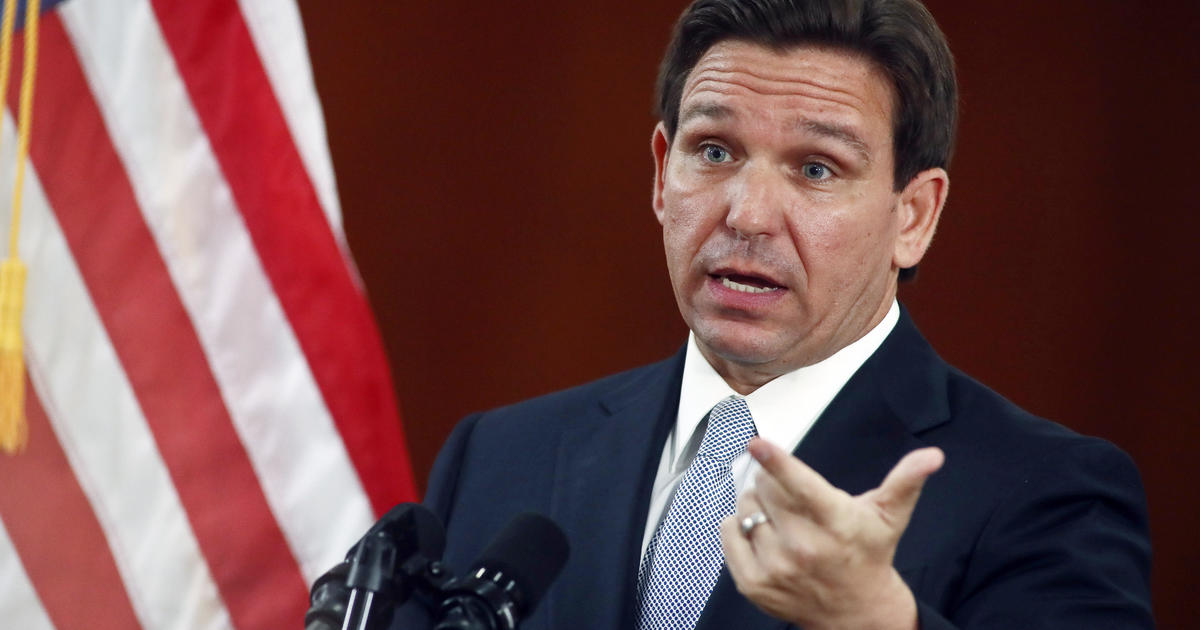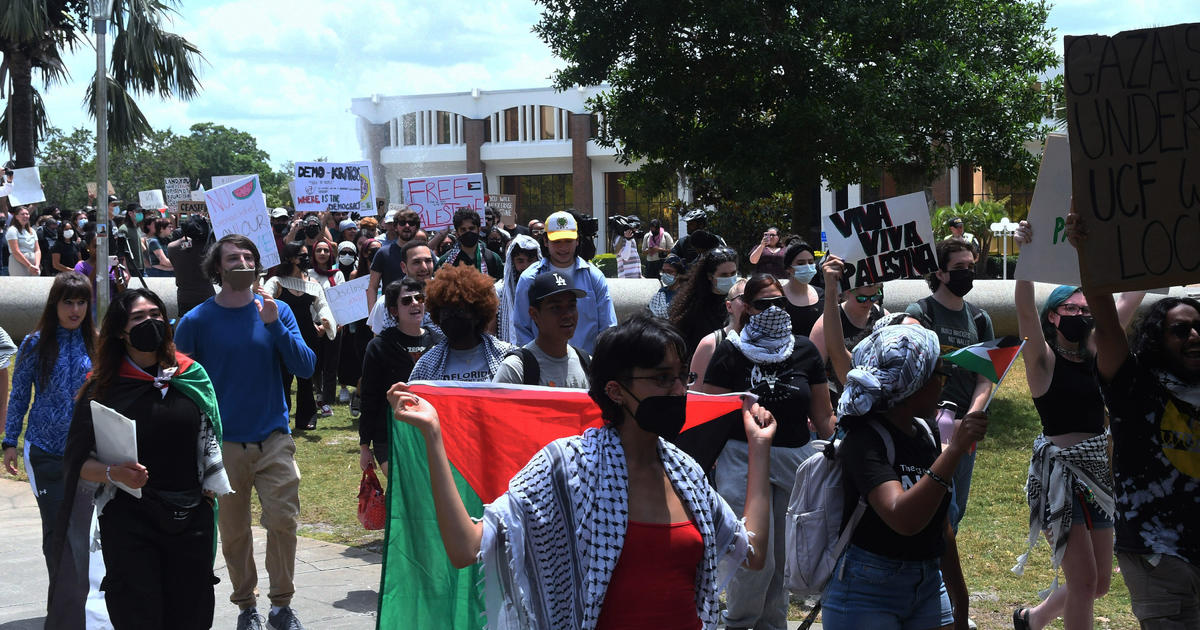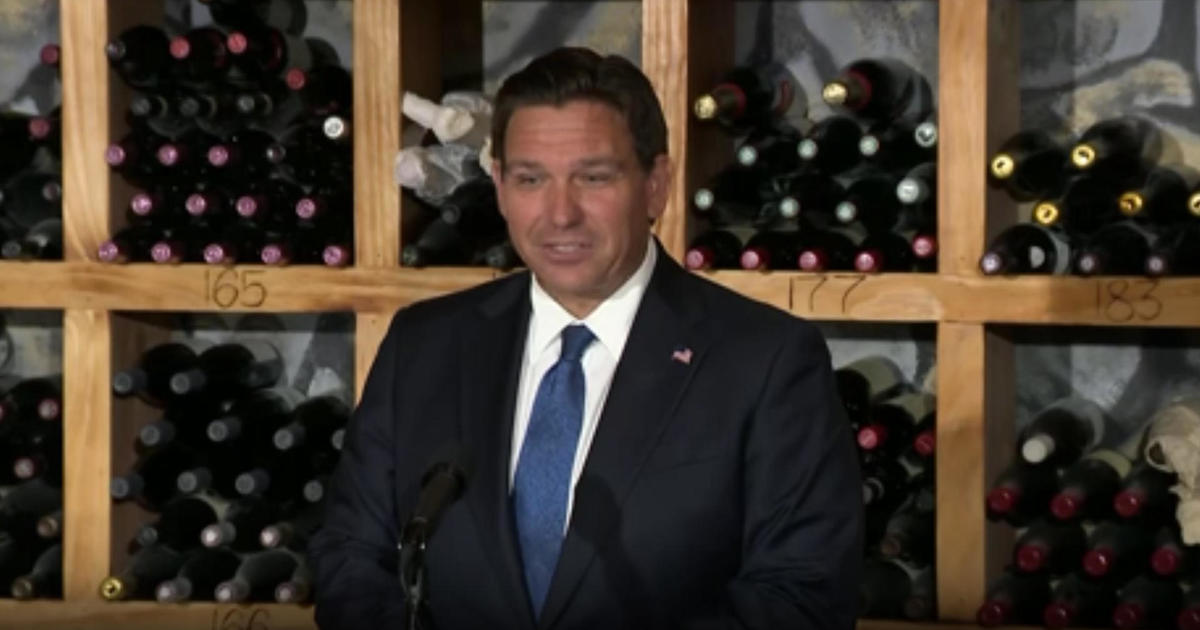Gov. DeSantis: State Needs Additional 30,000 To 40,000 Monoclonal Antibody Treatment Doses
MIAMI (CBSMiami) - As the Omicron variants surges across the state and the number of COVID-19 cases is on the rise, Gov. Ron DeSantis said Florida needs at least 30,000 more doses per week than it is receiving through the allocation system to expand capacity at existing monoclonal antibody treatment sites and open new sites to treat 250-300 patients per day at each site.
During a news conference Monday with Surgeon General Dr. Joseph Ladapo at Broward Health Medical Center, DeSantis said they were concerned when the federal government pulled back the supplies.
"The federal government had stopped sending both Regeneron and the Eli Lilly monoclonal. That was based off some preliminary study saying that it may not be as effective against Omicron. But of course, Omicron is not the only variant that's out there. And it's something that we actually have seen applied with Omicron patients, and we have seen symptoms resolved. So it's not clear that this is not something that is going to not be a benefit, it may not be as good as it was against Delta, we obviously want to have that here for patients to be able to do it," he said.
Federal data shows that the state's hospitals have more than 12,000 doses of Regeneron and Eli Lilly's monoclonal antibody treatments on hand, according to CBS4 news partner The Miami Herald.
DeSantis said his administration and Dr. Ladapo pushed back and the federal government changed their position.
"Yesterday, HHS decided to reverse course, and they are going to be sending these treatments. I think that's the right thing to do. We're past the point now where we're able to get it directly from any of these companies, the federal government has cornered the entire market, they basically took control of the supply in September. We had done a deal with GlaxoSmithKline on the sotrovimab, which a lot of people think is the most effective against Omicron. That is no longer a possibility because the feds have an exclusive arrangement," he said.
State-run monoclonal antibody treatment sites in Miami-Dade and Broward temporarily closed last Tuesday after running out of supplies.
Infectious Disease Specialist Dr. Aileen Marty from Florida International University says before getting treatment people need to know what strain of the virus they have.
"If it's not omicron we can use Regeneron. It's going to work. If it is omicron then we better use AstraZeneca," she said. "You don't want to give a drug that's not going to work. You need to know you're giving the right drug to the right patient," she said.
WATCH: Deborah Souverain's Report On What Gov. DeSantis Had To Say
Ladapo acknowledged the rapid rise in Omicron cases but said symptoms are generally less severe than previous variants.
DeSantis said with Omicron, vaccines are not preventing infections.
"Miami Dade, for example, is one of the most vaccinated places in the country, if not the world, and they've had huge, huge Omicron infections. And so that's just the reality, in terms of that this thing is spreading very, very rapidly. There's indications, and some studies out of South Africa, that an Omicron infection may generate immunity against the Delta variant. And that's important because, in Florida, particularly South Florida, we do believe it's overwhelmingly Omicron infections that are occurring, but Delta is still there," said DeSantis.
Ladapo said an upcoming shift in the approach to testing would put an emphasis on higher-risk people, but did not give specifics.
DeSantis said most of the people that get really seriously ill are still being infected with the Delta variant.
"It's important that to understand that and be able to have a strategy in place that that is going to deal with both of those. So we're able to be able to say today, now that we've gotten the pathway cleared with the Regeneron. Now that we've gotten the pathway cleared with the bamlanivimab, and of course, we want more and more of the sotrovimab, we have the ability, and we will immediately turn on additional sites," said DeSantis.
The governor said as the federal government gives the state a supply, they will open an additional monoclonal antibody treatment site in Broward County, Miami Dade County, Palm Beach County, and Central Florida.
"We have the ability to add five to 10 more sites as the demand may be but that is all contingent on the federal government sending the doses that we need. We're looking at probably between 30,000 and 40,000 additional doses, this will be used very easily. We've got the infrastructure in place. After we did our sites over the summer, once the demand declined, we were able to effectively mobilize them within each community," said DeSantis.
He said in some places hospitals will take the lead in administering the treatments, in other places it will be the sites.
"It's just a matter of the federal government giving us more doses to be able to administer for the Floridians who need it. So that will make a positive difference. We also had the foresight to ask the legislature in October to set aside money, so that we would be able to handle this and there'd be no issue with it, including purchasing our own supply. I don't think we have the option to do that in terms of the federal government's exclusive arrangement, but if they were willing to sell it, we have the ability to buy it ourselves," said DeSantis.
The governor also announced the state is coming up with a plan to deal with long testing lines, by coming up with guidelines for testing.
"I think what you're seeing is there's people who go to the drugs store and buy all these tests, they'll go multiple times a week and go to the sites and test without symptoms. That is just going to contribute to the crunch that you're seeing," Gov. DeSantis said.
"My department's goal is to put out testing that prioritizes, doesn't restrict, access to testing, but reduces the use of low value testing and prioritizes high value testing," said Ladapo.
He said we should look at a bigger picture.
"We need to unwind this testing sort of planning and living one's life around testing without it, we're going to be stuck in the same cycle," he added.
Dr. Marty said the most important thing is to stop the spread.
"If we let this thing transmit wildly it will continue to mutate into worse variants," she said.



